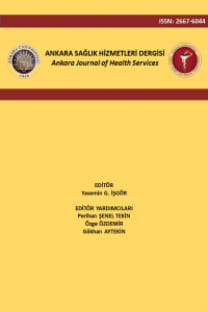Akciğer Tüberkulozu ve AkciğerKanserli Hastalarda Serum MalondialdehidSeviyesi ve Süperoksid Dismutaz Aktivitesi
Akciğer kanserleri, tuberkuloz, lipid peroksidasyon, superoksid dismutaz
SERUM MALONDIALDEHYDE LEVELS AND SUPEROXIDE DISMUTASE ACTIVITIES IN PULMONARY TUBERCULOSIS AND
lung cancers, tuberculosis, lipid peroxidation, superoxide dismutase,
___
- Halliwell B. Reactive oxygen species in living systems: Source, biochemistry and role in human disease. Am J Med 1991; 91: 14-21.
- Jung K, Seide 1B, Rudolph B et al. Antioxidant enzymes in malignant prostate cell lines and in primary cultured prostatic cells. Free Radical Biol Med 1997; 23: 127-33.
- Hochstein P, Atallah AS. The nature of oxidants and antioxidant systems in the inhibition of mutation and cancer. Mutat Res 1988; 202: 363-75.
- Timothy RR, Sharma HM. Free radicals in health and disease. Indian J Clin Pract 1991; 2: 15-25.
- Cerutti PA. Oxyradicals and cancer. Lancet 1994; 344: 862-3.
- Menkes MS, Comstock GW, Vuilleumier JP, Helsing KJ, Rider AA, Brookmeyer R. Serum beta- carotene, vitamins A and E, selenium and the risk of lung cancer. N Engl J Med 1986; 315: 1250-4.
- De Oliveira HG, Rosatto ER, Prolla JC. Pleural fluid adenosine deaminase and lymphocyte proportion: Clinical usefulness in the diagnosis of tuberculosis. Cytopathology 1994; 5: 27-32.
- Janero DR. Malondialdehyde and thiobarbituric acid reactivity as diagnostic indices of lipid peroxidation and peroxidative tissue injury. Free Radical Biol Med 1990; 9: 515-40.
- Penn ZJ, Steer PJ. Breech presentation. In: James DK, Steer PJ, Weiner CP, Gonik B (eds). High risk Pregnancy. Management options. London: WB Saunders 1996: 173-198.
- Kwiatkowska G, Piasecka MZ, Piotrowta W and Nowata D. Increased serum concentrations of conjugated diens and malondialdehyde in patients with pulmonary tb. Resp Med 1999; 93: 272-6.
- Pryor WA, Godber SS. Noninvasive measures of oxidative stress status in humans. Free Rad Biol Med 1991; 10: 177-184.
- Yoshika T, Kawada K, Shimada T, Moru M. Lipid peroxidation in maternal and cord blod and protective mechanisms against activated oxygen toxicity in the blood. Am J Obstet Gynecol 1979; 135: 372-6.
- Yi-Sun, Larry W Oberley and Ying Li. A simple method for clinical assay of superoxide dismutase. Clin Chem 1988; 3413: 497-500.
- Durak İ, Canbolat O, Kavutçu M, Öztürk HS; Yurtarslanı Z. Activities of total, cytoplasmic and mitochondrial superoxide dismutase enzymes in sera and pleural fluids from patients with lung cancer. J Clin Lab Anal 1996; 10: 17-20.
- Ward PA, Till GO, Hathermill J, Annesley T.M, Kunbel PG. Systemic complement activation, lung injury and products of lipid peroxidation. J Clin Invest 1985; 76: 517-527.
- Janoff A. Investigation into the biochemical mechanisms of pulmonary emphysema: effects of cigarette smoke on enzymes and antienzymes in the lung. Respiration 1986; 50 (suppl 1); 13-25.
- Dormandy TL: Free-Radical oxidation and antioxidants. Lancet 1978; 1: 647-53.
- Sztrowski TP, Nathan CF. Production of large amounts of hydrogen peroxide by human tumor cells. Cancer Res 1991; 51: 794-8.
- Jaruga P, Zastawny TH, Skokowski J, Dizdaroğlu M, Olinsky R. Oxidation DNA base damage and antioxidant enzyme activities in human lung cancer. FEBS letters 1994; 341: 59-64.
- Demling R, Lalonde C. Relationship between lung injury and lung lipid peroxidation caused by recurrent endotoxemia. Am Rev Respir Dis 1989: 139: 1118-24.
- Kwee JK, Mitidien E. Alfonso OR: Lowered superoxide dismutase in highly metastatic B 16 melanoma cells. Cancer Lett 1991 57: 199-202.
- Bhuvarahamarthy V, Balasubramanian N, Govindasamy S. Effect of radiotherapy and chemoradiotherapy on circulating antioxidant system of human uterine cervical carcinoma. Molecular and cellular Biochemistry 1996; 158: 17-23.
- McCord JM. Fridovich I. Superoxide dismutase. An enzyme function for erythrocuprein (hemocuprein). J Biol Chem 1969; 244: 6049-55.
- Zieba M, Suwalski M, Kwiatkowska S et al. Comparison of hydrogen peroxide generation and the content of lipid peroxidation products in lung cancer tissue and pulmonary parenchyma. Respir Med 2000; 94(8): 800-5.
- Steaper SD, Fabris M, Ferrari V, Carbonare MO, Leon A. Quercatin protects cutaneous tissue- associated cell types including sensory neurons from oxidative stress induced by glutathione depletion: cooperative effects of ascorbic acid. Free Radical Biology and Medicine 1997; 222(4): 669-678.
- Comporti M. Biology of disease: lipid peroxidation and cellular damage in toxic liver injury. Lab Invest 1985; 53: 599-623.
- Vanisree AJ, Shyamaladevi CS. Status of lipid peroxidation and antioxidant enzymes in malignant (bronchogenic carcinoma) and non-malignant pleura effusions. Indian Journal of cancer 1999; Vol 36: 127-134.
- Yayın Aralığı: Yılda 2 Sayı
- Başlangıç: 2000
- Yayıncı: Ankara Üniversitesi
Postoperatif Ağrıda Transdermal Fentanil Kullanımı
S İNAN, T ÖZGÜDER, H.S. VATANSEVER, K ÖZBİLGİN, M. SANCI, S. SAYHAN
Ulukavak ÇİFTÇİ TANSU, Yıldız GÜNEY, Ayşe BİLGEHAN, Filiz ÇİMEN
Endometriyal Hiperplazilerin Tedavisinde Vajinal Progestoron Jelin Etkinliği
Bülbül BAYTUR YEŞİM, Semra ORUÇ, Barış ÇOBAN, Fatma ESKİCİOĞLU, Rıza KANDİLOĞLU Ali
Normal ve Sezeyan Doğumlarda Maternal ve Umbinikal Kordon Karnında Endotelin-1 Düzeyleri
BÜLBÜL BAYTUR Yeşim, Cevval ULMAN, Göker TAMA Aslı, Ahmet VAR, Hüsnü ÇAĞLAR
Epidermoid Baş-Boyun Kanserlerinin Tedavisinde Hiperfraksiyone Radyoterapi Sonuçları
Ayşe HİÇSÖNMEZ, Yıldız GÜNEY, Ayşen DİZMAN, Nalça ANDRIEU MELTEM
Yıldız GÜNEY, Ayşe BİLGİHAN, Ulukavak ÇİFTÇİ TANSU, Filiz ÇİMEN, Özgür COŞKUN
